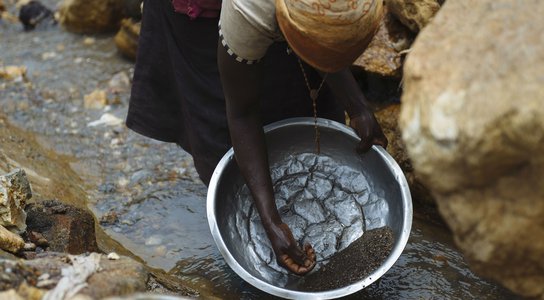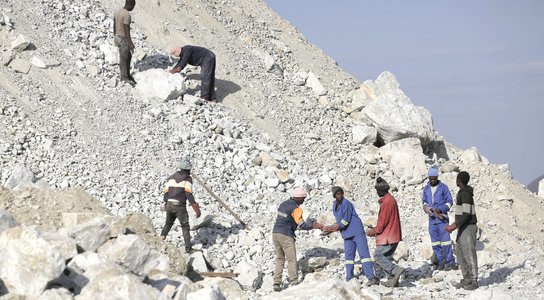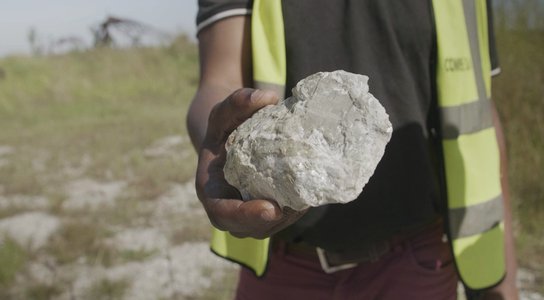Three lithium mines in Zimbabwe, Namibia and Democratic Republic of Congo (DRC) are linked with major corruption red flags and some face allegations of human and environmental rights violations, according to a new report by Global Witness.
London, November 14 - Three lithium mines in Zimbabwe, Namibia and Democratic Republic of Congo (DRC) are linked with major corruption red flags and some face allegations of human and environmental rights violations, according to a new report by Global Witness.
The investigation found that:
- At the Sandawana mine, Zimbabwe, in 2022 an estimated 5,000 local miners were found to be working in unsafe conditions. There were reports of child labour, sanitation issues and miners being buried by a mine collapse. In early 2023 it was reported that miners had been evicted, their minerals confiscated, and the mine taken over by companies with close links to Zimbabwe’s ruling ZANU-PF party and the military, including entities facing US or EU sanctions.
- In Namibia, Chinese-owned firm Xinfeng Investments has been accused of acquiring its Uis lithium mine through bribery. Local people and Namibian parliamentarians have accused Xinfeng of housing workers in ‘apartheid conditions’, buying off local chiefs and scaring away the wildlife that brings tourism into the area. Xinfeng has shipped thousands of tonnes of raw lithium ore to China, failing to deliver on promises to build processing facilities within Namibia.
- In DRC, the state-owned mining company that signed the deal for the Manono mine development was accused by DRC’s anti-corruption agency of selling lithium rights at a cut price and squandering the profits. The acquisition of the project by an Australian company appears to have generated as much as US$28 million for shell companies held by middlemen implicated in previous corruption scandals involving ex-President Joseph Kabila. And an aide of President Felix Tshisekedi’s party reportedly received $1.6 million in ‘commission’ from Zijin Mining when it acquired shares in the project.
Africa is at the centre of a geo-political powerplay for the minerals used in clean energy technologies that will fuel a global, green energy transition. Lithium – or ‘white gold’ – is one of the most sought-after transition minerals, used in electric vehicles and wind turbines.
As leaders gather in Brussels for EU Raw Materials Week (13-17 November 2023), and with the EU Critical Raw Materials Act on the verge of being adopted, Europe’s supply of minerals that are crucial for the energy transition is high on the agenda. The EU must ensure that mineral supply chains are in line with the highest international human rights, environmental and governance standards and support producer countries to process and manufacture battery materials locally. This is imperative if we are to ensure a just and equitable energy transition that benefits all people and the planet.
Global Witness contacted several companies and individuals named in the report and the replies received are included in our full report, available at https://www.globalwitness.org/en/campaigns/natural-resource-governance/lithium-rush-africa (or on request prior to the embargo date).
Colin Robertson, Investigator at Global Witness, said:
“Africa finds itself in the midst of a scramble for lithium that, rather than benefitting its citizens, could end up fuelling corruption and leaving a poisoned legacy of pollution and human rights abuses. The global demand for lithium is dramatically increasing as manufacturers and governments in Europe, the US and China look to dominate the sustainable energy market and meet climate targets. They have a responsibility to demand more transparency, environmental best practice and improved labour conditions in their supply chains.”
Emmanuel Umpula, AFREWATCH, said:
“The current economic model does not allow Africa to benefit from its wealth of natural resources such as lithium. We need a model involving local processing of minerals and the production of battery precursors to boost our economies. That requires effective measures against corruption, as well as better labour conditions, contributions to community development and environmental protection.”
Contact
-
Sophie Marsden
Senior Communications Advisor - Natural Resource Governance


